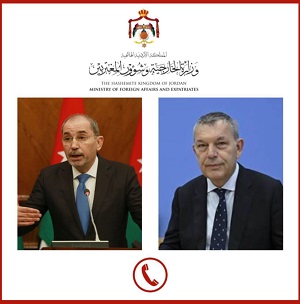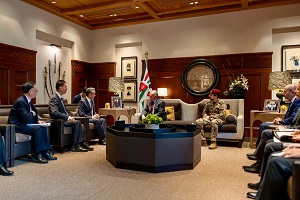The Folly of Reengaging Assad - By Charles Lister, Foreign Policy

In recent weeks, speculation has swirled around whether Turkey may be considering some form of reengagement with Syrian President Bashar al-Assad’s regime. Although there are many reasons to remain highly skeptical about such a prospect, the idea of exploring new contacts with Damascus is not an altogether new development.
Although the Assad regime’s horrific record of war crimes and crimes against humanity is well known—with international prosecutors asserting that more evidence exists to prosecute Assad’s regime for international crimes than the international community presented at the Nuremberg trials in charges against former dictator Adolf Hitler’s Nazi Party—several governments in the Middle East have recently pursued policies to reengage and normalize Syria’s regime. In today’s climate, it is worth considering the fate and consequences of these deeply controversial initiatives.
The United Arab Emirates has arguably pushed most determinedly to normalize Assad, using business ties and the prospect of investment in Syrian industry and infrastructure as its main channel. Abu Dhabi Crown Prince Sheikh Mohamed bin Zayed Al Nahyan and Sheikh Mohammed bin Rashid al Maktoum, who rules Dubai, even rolled out a red carpet for Assad for a surprise visit in March, something senior U.S. officials only discovered on social media, having received no heads-up from Abu Dhabi. For its efforts, the UAE was removed from the International Contact Group on Syria; has failed to follow through on any substantive deal with Damascus; and has attracted the attention of sanctioning authorities in Europe and the United States as well as investigative bodies focused on corruption, money laundering, and sanctions evasion.
Algeria has long avoided opposing Syria’s regime, but it has worked intensively through 2021 and 2022 to convince Arab League members to readmit Syria into the regional body—efforts that have now failed. For periods of time, Egypt, Bahrain, and Oman have also reengaged with Assad’s regime—but to little effect either.
The failure to reengage Assad without simply lending him free credibility and undermining the cause of justice is perhaps most pronounced when it comes to Jordan. Despite having been a longtime and pivotally important backer of Syria’s armed anti-Assad opposition since 2012, Jordan flipped in 2017 and 2018, eventually stepping forward to greenlight a brutal, Russian-coordinated Syrian regime campaign against southern Syria in the summer of 2018. Amman’s reasoning for turning against Syria’s opposition was its desire for stability along its border, to create conditions amenable to refugee returns, and to rid southern Syria of Islamic State cells as well as an extensive Iranian and Hezbollah presence.
As hundreds of thousands of Syrian civilians were swiftly besieged and indiscriminately bombed from the ground and air, Jordan forced its yearslong Free Syrian Army partners to surrender, according to interviews I conducted with commanders at the time. In exchange, they were promised by Jordan a Russian-guaranteed reconciliation process.
In return for Jordan’s willingness to turn on its longtime partners and leave them defenseless, Syria and Jordan moved to reopen the Nassib crossing in October 2018 to resume trade between the two countries. In the years that followed, trade between Syria and Jordan rose by approximately 15 percent to a grand total of $94 million as of 2020—just a fraction less than the cost of one of the more than 50 F-16 fighter jets currently operated by the Royal Jordanian Air Force.
Beyond the negligible benefit of resuming trade, Russia’s promise of “reconciliation” has resolutely failed. Syria’s southern province of Daraa is now arguably the most unstable region in the country, riddled with daily insurgent attacks, inter-factional strife, targeted assassinations, and more. Within that chaos, which Russia has consistently failed to resolve, not only does Iran remain in place alongside Hezbollah and a network of local proxy militias but Iran and its proxies have expanded their reach and influence, commanding some 150 military facilities across southern Syria. The Islamic State, too, continues to conduct sporadic attacks in the area.
If all of this was not proof enough that Jordan’s reengagement with Syria’s regime has been a failure, then the enormous surge in Assad’s regime-sponsored drug smuggling through Jordan should be sufficient. With Syria’s economy in tatters after more than 11 years of conflict and decades of corruption, the regime’s crony elite has pivoted to drugs—and particularly to the illicit production of Captagon, an amphetamine-like stimulant known as the “poor man’s cocaine.” Thanks to this Captagon industry, Syria is now a narco-state of global significance. In 2021, as much as $30 billion worth of Captagon was produced in facilities guarded by private military contractors and smuggled out of Syria by the country’s most powerful security body, the Fourth Armored Division, which is commanded by Assad’s brother Maher, often in coordination with Hezbollah.
That $30 billion figure is around 35 times the scale of Syria’s legal export industry. There is simply no other part of the economy that matters anymore, and it continues to grow exponentially. According to Jordanian officials, 16 million Captagon pills were seized on Jordanian soil coming from Syria in 2021; in the first five months of 2022, that number stood at 20 million pills, and today, that number has reached 33 million. Other drugs also emanating from Syria and seized in Jordan have exploded in scale: from 1 kilogram of heroin in 2021 to 36 kilograms so far in 2022, for instance.
Jordan tried to reestablish ties with the Syrian dictator’s regime. It was a disaster.
By Charles Lister, a senior fellow and director of the Syria and Counterterrorism and Extremism programs at the Middle East Institute.
A woman looks down at her phone on a sidewalk near a banner showing Assad's and Putin's faces with the caption “Justice Prevails" on it in Arabic.
A woman looks down at her phone on a sidewalk near a banner showing Assad's and Putin's faces with the caption “Justice Prevails" on it in Arabic.
A banner depicting Syrian President Bashar al-Assad and Russian President Vladimir Putin with the caption “Justice Prevails” is displayed along a highway in Damascus, Syria, on March 8. LOUAI BESHARA/AFP VIA GETTY IMAGES
SEPTEMBER 28, 2022, 3:35 PM
In recent weeks, speculation has swirled around whether Turkey may be considering some form of reengagement with Syrian President Bashar al-Assad’s regime. Although there are many reasons to remain highly skeptical about such a prospect, the idea of exploring new contacts with Damascus is not an altogether new development.
Although the Assad regime’s horrific record of war crimes and crimes against humanity is well known—with international prosecutors asserting that more evidence exists to prosecute Assad’s regime for international crimes than the international community presented at the Nuremberg trials in charges against former dictator Adolf Hitler’s Nazi Party—several governments in the Middle East have recently pursued policies to reengage and normalize Syria’s regime. In today’s climate, it is worth considering the fate and consequences of these deeply controversial initiatives.
The United Arab Emirates has arguably pushed most determinedly to normalize Assad, using business ties and the prospect of investment in Syrian industry and infrastructure as its main channel. Abu Dhabi Crown Prince Sheikh Mohamed bin Zayed Al Nahyan and Sheikh Mohammed bin Rashid al Maktoum, who rules Dubai, even rolled out a red carpet for Assad for a surprise visit in March, something senior U.S. officials only discovered on social media, having received no heads-up from Abu Dhabi. For its efforts, the UAE was removed from the International Contact Group on Syria; has failed to follow through on any substantive deal with Damascus; and has attracted the attention of sanctioning authorities in Europe and the United States as well as investigative bodies focused on corruption, money laundering, and sanctions evasion.
Algeria has long avoided opposing Syria’s regime, but it has worked intensively through 2021 and 2022 to convince Arab League members to readmit Syria into the regional body—efforts that have now failed. For periods of time, Egypt, Bahrain, and Oman have also reengaged with Assad’s regime—but to little effect either.
That $30 billion figure is around 35 times the scale of Syria’s legal export industry. There is simply no other part of the economy that matters anymore, and it continues to grow exponentially. According to Jordanian officials, 16 million Captagon pills were seized on Jordanian soil coming from Syria in 2021; in the first five months of 2022, that number stood at 20 million pills, and today, that number has reached 33 million. Other drugs also emanating from Syria and seized in Jordan have exploded in scale: from 1 kilogram of heroin in 2021 to 36 kilograms so far in 2022, for instance.
Although limited drug smuggling has always existed across the Syria-Jordan border, the scale of the Syrian drug trade has exploded in the last two years. The most acute spike occurred (and has since continued) immediately after Jordanian King Abdullah II’s decision to speak with Assad on the phone in October 2021. Since then, dozens of people have been killed in border clashes associated with the Syrian drug trade, and although Jordan had previously been a transit point toward the prime market in the Persian Gulf, it has since become a key market itself, with Captagon use in the country now described as an “epidemic,” particularly among young people and amid a 30 percent unemployment rate.
That Jordan’s reward for reengaging Assad’s regime came in the form of an unprecedented wave of drug smuggling speaks to the extreme cynicism with which Assad is willing to treat neighbors that had only recently sought his overthrow. Given the extraordinary scale of the Captagon industry in regime-held areas of Syria, a dramatic and exponential spike in smuggling into Jordan does not happen by accident or coincidence. Moreover, it also underlines the existential importance of the drug trade to Assad’s faltering economy. When push comes to shove, keeping the drug money rolling takes priority over attempts to encourage regional reengagement and acts of normalization. In other words, Assad is quite happy and has no choice but to have his cake and eat it too.
According to Jordanian diplomats, the drug smuggling industry in Syria has only “recently” become “well organized,” with smuggling operations happening daily, each involving around 200 personnel split into groups—some conducting surveillance using drones and diversionary teams of gunmen seeking to distract Jordanian forces. Senior Jordanian officials have since visited Washington, providing private briefings on the sophistication of the drug smuggling threat, its direct links to the core of the Syrian regime, and the role of Iran and Hezbollah.
Unsurprisingly, Jordan’s public expressions of “brotherly” friendship with the Syrian regime have ceased, and government ministers have pivoted their Syria talking points to topics like refugees and Iran—a clear realignment back with the status quo ante. The only exception to that is Jordan’s continued drive to convince the U.S. government to grant a sanctions waiver for a regional energy deal that would involve passing energy through Syria—some of which would remain in Syria (some passing directly through lines that feed regime prisons and military facilities) as payment. Such a deal, while intended to provide Lebanon with 1 to 2 hours of electricity per day, would do little more than strengthen Syria’s hand inside Lebanon and place Assad at the heart of a major regional arrangement with international backing.
Although Jordanian Foreign Minister Ayman Safadi claims Syria’s crisis may be resolved via a “step-by-step approach” to engaging Assad’s regime—whereby the international community would offer Damascus benefits in exchange for reciprocal positive steps by Syria—in reality, Jordan’s approach is guided by a belief that integrating Assad’s regime back into regional mechanisms will encourage better behaviors and discourage bad ones. While there is zero evidence to support such an assumption, there is an almost endless list of examples for why the opposite is more likely. In fact, Jordan’s own experience in reengaging Assad’s regime is perhaps the best evidence that a “step-by-step approach” will only see concessions granted to Damascus—and in return, nothing (or worse).
With the benefit of hindsight, Jordanian officials now claim privately that their intention was never to fully reengage Assad’s regime, let alone normalize it. But that was not the language Jordanian officials defensively employed in late 2021 when faced with a wave of criticism for Jordan’s clear and unequivocal reengagement. Back then, high-level visits and contact with the regime were justified privately to me and many others as steps taken to stabilize southern Syria and create conditions to facilitate refugee returns while also bolstering trade, strengthening border security, ending drug smuggling, and exploring step-by-step engagement with Assad.
Such calculations could not have been more wrong, and the consequences have been clear and damning. That the Jordanian king’s Syria policy “white paper” presented to the White House in July 2021 read a little too closely to long-standing Russian talking points should have rung alarm bells. After all, Jordan’s policy reversal on Syria dating back to 2017 took place through a process of direct negotiation and coordination with Moscow—and such contact has continued apace since. Instead though, Jordan was granted a de facto “orange light”—that is, a proceed-with-caution signal—to go ahead.
Months later, Jordan has barely criticized Russia’s invasion of Ukraine. Given Amman’s close strategic relationship with Washington, the effects of Jordan’s short-lived reengagement with Assad’s regime have dealt a severe blow to international efforts to sustain a meaningful policy aimed at stabilizing change and justice in Syria. The United States continues to exert influence and resources to convince its international partners to maintain a united front in opposing Assad’s return to the world fold, but when one of its closest regional strategic allies breaks that line, the walls begin to crack.
Despite all of this, Jordan has just been granted a $10.5 billion economic deal with the United States and begun benefiting from a marked expansion of multinational military cooperation in securing its border with Syria. Although policymakers may have been forgiving of Jordan for its miscalculations on Syria, the lessons learned from those mistakes should not be forgotten. The idea that working with Assad’s regime will bring any tangible benefits should be met with the cynicism that it deserves.




